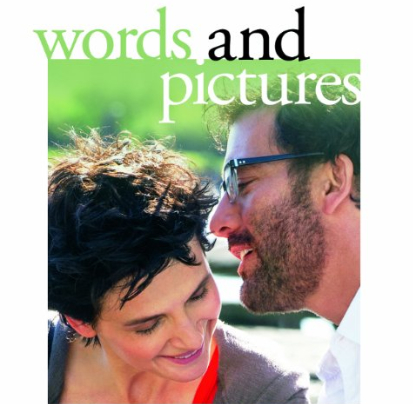Fred Schepisi's Words and Pictures opens in Vancouver July 4, 2014
Fred Schepisi (Six Degrees of Separation, Roxanne ) directs Gerald Di Pego's (The Forgotten, Message in a Bottle) romantic comedy, Words and Pictures, starring Clive Owen (Jack Marcus) and Juliette Binoche (Dina Delsanto) about a washed up writer (Markus) and a renowned artist (Delsanto) who is gradually losing the ability to create as her health declines.
Marcus and Delsanto are two artists who have both turned to teaching at a prep school as their abilities fade. Marcus teaches Honours English while Delsanto teaches Honours Drawing and Painting, and the two become instant rivals when Delsanto challenges the legitimacy of words over pictures as a dominant means of communicating and connecting. Marcus responds by staging a school-wide war where the students are challenged to debate and ultimately decide which is more powerful.
This film was baffling for many reasons. Owen and Binoche, while brilliantly cast, do not have suitably fleshed-out characters or storyline to work with. Owen's character is such a one-sided, dysfunctional misfit that instead of cheering for the romance, you end up crossing your fingers for the opposite. The cast of students are amateurish and one-dimensional in both dialogue and acting, the closing dialogue and interaction between Marcus and Disanto is boring and repugnant, and the camerawork itself was bland and uninteresting.
The secondary story thread of harassment overpowers the main storyline of the film and feels like it popped out of an entirely different movie altogether. The perpetual harassment of the young woman goes entirely unaddressed by anyone in a position to do something, until things escalate to something that is apparently much worse than anything that has lead up to it and huge enough to take notice: a rude cartoon drawing. This is a film about art and words so it is understandable that the writer would try to find some way to link that: it just doesn't work, in fact, it frightfully diminishes the severity of the ignored experiences she's endured up to that point.
The story ends with the much talked about debate between the words people and the pictures people. It's never clear throughout the film who is on which side of the debate, but the room appears to be equally divided. As the camera moves over to two of the confused looking teachers, one of them say to the other, “just smile and clap”, and that about sums it up. This hugely anticipated debate is supposedly what the film is all about, but we don't get to see or hear anything. There are a few opening statements made, and that's it: no pay off.
Schepisi is an otherwise wonderful director, Di Pego's talent for writing is evident, and the lead actors are proven talents, so it's not clear how this ended up the way it did.
Marcus and Delsanto are two artists who have both turned to teaching at a prep school as their abilities fade. Marcus teaches Honours English while Delsanto teaches Honours Drawing and Painting, and the two become instant rivals when Delsanto challenges the legitimacy of words over pictures as a dominant means of communicating and connecting. Marcus responds by staging a school-wide war where the students are challenged to debate and ultimately decide which is more powerful.
This film was baffling for many reasons. Owen and Binoche, while brilliantly cast, do not have suitably fleshed-out characters or storyline to work with. Owen's character is such a one-sided, dysfunctional misfit that instead of cheering for the romance, you end up crossing your fingers for the opposite. The cast of students are amateurish and one-dimensional in both dialogue and acting, the closing dialogue and interaction between Marcus and Disanto is boring and repugnant, and the camerawork itself was bland and uninteresting.
The secondary story thread of harassment overpowers the main storyline of the film and feels like it popped out of an entirely different movie altogether. The perpetual harassment of the young woman goes entirely unaddressed by anyone in a position to do something, until things escalate to something that is apparently much worse than anything that has lead up to it and huge enough to take notice: a rude cartoon drawing. This is a film about art and words so it is understandable that the writer would try to find some way to link that: it just doesn't work, in fact, it frightfully diminishes the severity of the ignored experiences she's endured up to that point.
The story ends with the much talked about debate between the words people and the pictures people. It's never clear throughout the film who is on which side of the debate, but the room appears to be equally divided. As the camera moves over to two of the confused looking teachers, one of them say to the other, “just smile and clap”, and that about sums it up. This hugely anticipated debate is supposedly what the film is all about, but we don't get to see or hear anything. There are a few opening statements made, and that's it: no pay off.
Schepisi is an otherwise wonderful director, Di Pego's talent for writing is evident, and the lead actors are proven talents, so it's not clear how this ended up the way it did.


 RSS Feed
RSS Feed
